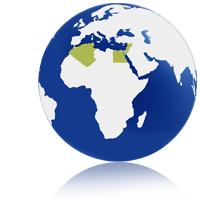Global Connectivity: World Regions
| Africa & the Middle East | Asia & Pacific |
North Africa and the Middle East
EUMEDCONNECT3
Providing a dedicated Internet network for research and education for the Mediterranean since 2004, the EUMEDCONNECT programme (now in its 3rd phase) offers countries across the region the opportunity to connect universities and research centres on their national networks to over 50 million users at over 8000 research and education establishments across Europe and further afield. The beneficiary countries of EUMEDCONNECT3 are Algeria, Morocco, Tunisia, Egypt, Palestine, Jordan and Lebanon.
Following the events of the Arab Spring, some of the project’s partner countries have temporarily had to disconnect from EUMEDCONNECT as they rebuild their relationships with their government ministries and funding agencies.
The table and diagram below show the current status of the network:
| NREN Name | Country | Mbps Connection |
|---|---|---|
| ARN | Algeria | connected at 622Mbps |
| ASREN (JUNET) | Jordan | connected at 155Mbps |
| ENSTINET | Egypt | connected a 622Mbps |

ASREN (the Arab States Research and Education Network) operates a dedicated PoP in London, currently with Jordan connected. The PoP is available for direct interconnection by EUMEDCONNECT3 partners and for connecting via hubs in Europe on the GÉANT network.
Significant efforts are underway as part of EUMEDCONNECT3, in cooperation with ASREN, the NRENs and with the EC, to reconnect other beneficiary partners. In addition, relationships are being developed with NRENs in the Gulf region.
Providing a R&E network for the Mediterranean since 2004
Running from 2011-2014, EUMEDCONNECT3 is co-funded with €3.3m by the European Union and is in its third phase. Through its earlier phases, the EUMEDCONNECT programme has connected Algeria, Egypt, Jordan, Morocco, Palestine, Syria and Tunisia since 2004, promoting regional development and addressing local challenges, such as telecom monopolies and poor infrastructure. In the current phase, connections are being re-established, initially with Algeria, Egypt and Palestine, with additional countries eligible for EC funding support.
EUMEDCONNECT3 forms the platform for the ASREN organisation which has been launched to create a R&E network for the wider Arab region. This is a strategic step that is expected to lead to long-term sustainability of e-Infrastructures in the Mediterranean and the neighbouring Gulf region, potentially serving a population of over 250 million people and ensuring that scientists and academics in the region can continue to participate in world-class research and education activities.
As Mediterranean neighbours, the NRENs of Cyprus, France, Greece, Italy and Spain are particularly interested in the collaboration opportunities offered by the programme and are active partners. EUMEDCONNECT3 is run by DANTE, in collaboration with ASREN, the European and local NRENs.
To learn more, visit the EUMEDCONNECT3 website.
Connecting to Other Middle East Countries
United Arab Emirates
ANKABUT is the Research and Education Network for the United Arab Emirates. ANKABUT, which means spider in Arabic, interconnects federal universities in the UAE and provides for international connectivity with Research and Education Networking peers. Via an ANKABUT link to Internet2 in the United States, academics and researchers in Europe and the UAE are able to collaborate with one another.
Qatar
Established in 1995, the
Qatar Foundation is a not-for-profit organisation which focuses on education, scientific research and community development in the state of Qatar. The Qatar Foundation’s flagship project is Education City, a 1,000-hectare campus on the edge of Doha where most of its member institutions are located. In a similar fashion to ANKABUT in the UAE, connectivity between the Qatar Foundation and GÉANT is provided indirectly.
Saudi Arabia
SARInet is the Saudi Arabian Research and Education Network which is formed by the King Abdullah University of Science and Technology (KAUST) and the King Abdulaziz City for Science and Technology (KACST). SARInet is administered and operated by KACST. A 1-Gbps link from SARInet to GÉANT has been implemented by KAUST and has been operational since early 2011.




